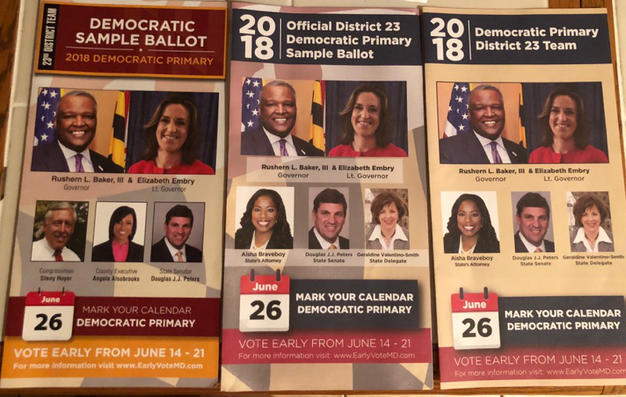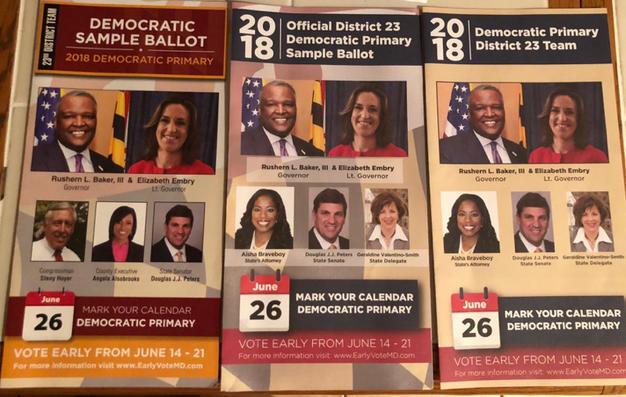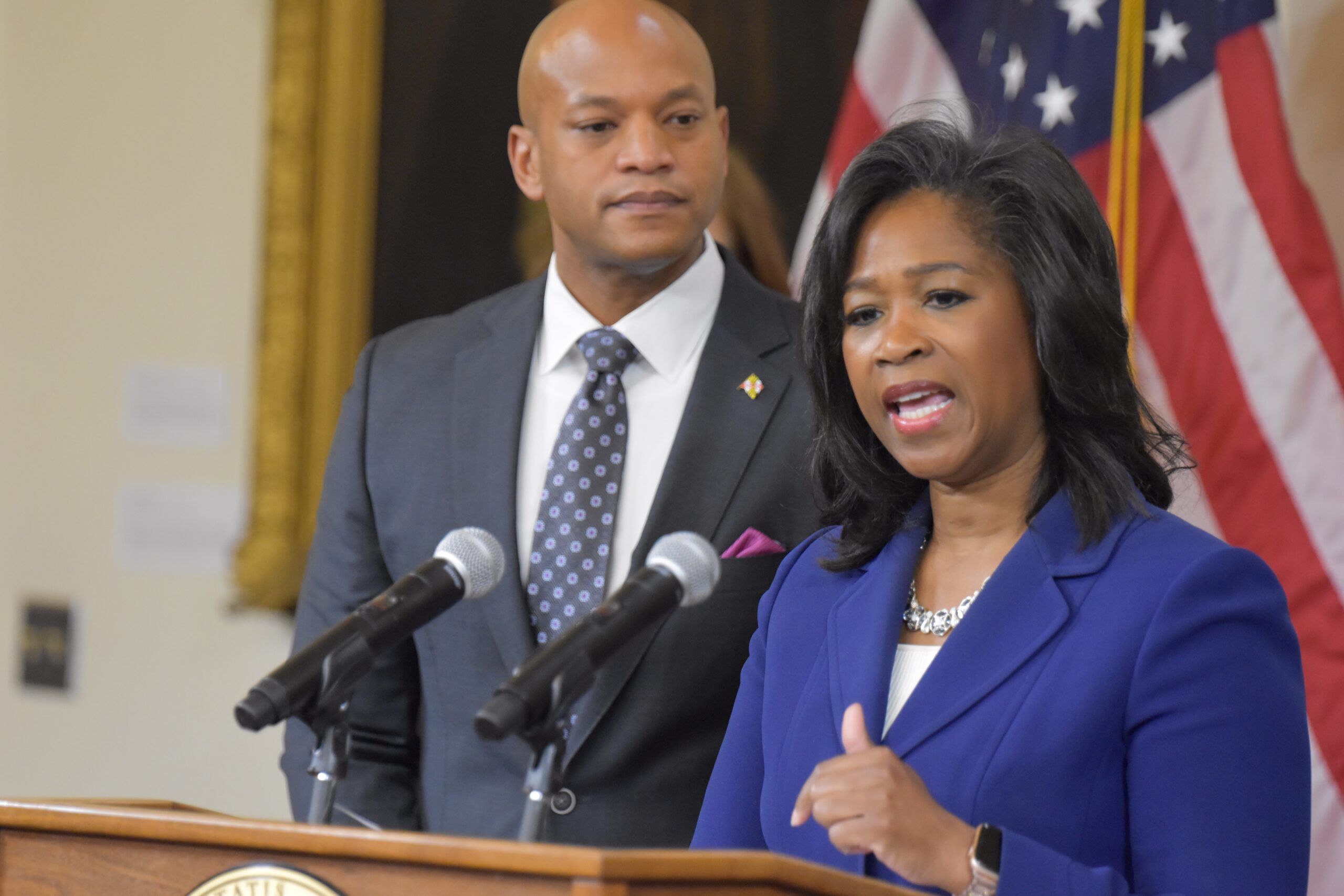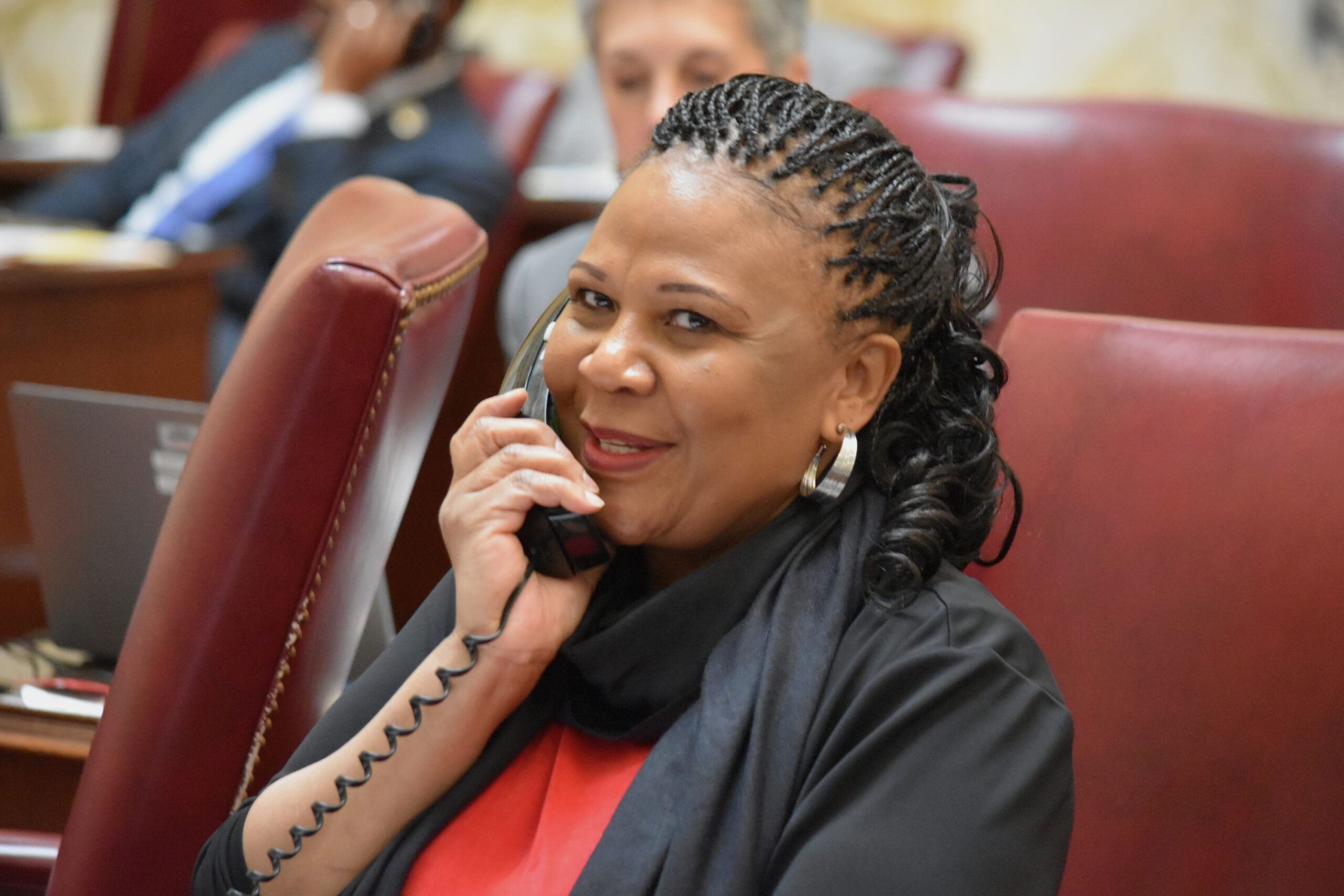Activists in Prince George’s Take Aim at ‘Official’ Primary Ballots

A potent campaign season tool in Prince George’s County for decades is attracting the ire of newly energized Democratic activists who want party leaders to step in and ban a tactic they claim is designed solely to confuse the electorate. The cause of their fury: campaign literature that includes the words “Official Democratic Sample Ballot.” Many voters receive multiple copies of such literature, particularly in the last days before a primary. In most instances, the brochures mimic actual ballots, with check-marks next to certain candidates’ names. But they are not official. The slates, comprised mostly of incumbents, have distributed these brochures for decades, and hope voters will take their brochures into the voting booth for guidance. But critics say they are intended to mislead, not inform – and they are pressing for change. A petition, posted at moveon.org and signed by hundreds of people, will be delivered to state Democratic Chairwoman Kathleen Matthews next week. “Many voters were tricked into believing that certain candidates were no longer Democrats, no longer running, or running for different positions,” the petition states. “This practice was created to confuse voters into believing that certain candidates were supported by the Democratic party when all candidates are Democrats in a Democratic Primary.”  Democratic activists in Prince George’s County are trying to stop the practice of powerful incumbents issuing “official ballots” in the primary that are designed to sway voters — and ignore or deny the existence of insurgent candidates. “It is time for this practice to end,” sponsors of the drive conclude. “Sign this petition to ensure that we protect our community from misleading information.” Nearly 700 people had signed the petition as of Sunday evening. The petition was organized by Walakewon “Wala” M. Blegay. Like many of the most passionate opponents of so-called “official” ballots, Blegay lost a House of Delegates primary in June to a slate in District 25 made up of incumbents and their allies. “We had a really strong campaign,” she said. “We knocked on thousands of doors. But then I started getting phone calls from people saying, ‘How come I’m not running as a Democrat?’ or ‘How come I’m not on the ballot?’” She too received multiple copies of the “official” ballot in the mail. “I looked at them and they said ‘official.’ And I thought, what’s ‘official’ about this?” LaTasha Ward, an unsuccessful candidate in District 24, said her opponents “saturated the community with those ballots. Even if you tried to give them your literature, they said, ’No, I already have my official sample ballot.’” Community organizer and labor leader Theresa Mitchell Dudley said the issue arose at a contentious meeting of the Prince George’s County Democratic Central Committee, of which she is a member, last week. She called the brochures “false advertising.” “Why does it survive? It works.” Matthews, the party chairwoman, is aware of the anger these ballots are causing at the grass-roots level. According to a source, she will convene a “working group” of party leaders to look at “ethical campaigning” — including the use of campaign literature that falsely claims to be official. But banning the practice won’t be easy, as they are an established way for incumbents to combine resources and reinforce their status. Defenders say the First Amendment gives them the right to call their literature “official,” even if there is little basis for the claim. Long-time activists — including some who have used “official” ballots in their own campaigns — acknowledge that the decades-old practice flows largely from the influential Prince George’s County Senate delegation. The ballots are thought to be particularly effective when a House of Delegates seat comes open. The decision about which challenger to include on the incumbent slate, and whether to have his or her name and photo appear alongside well-known officeholders, can be decisive. “It really goes back to [Maryland Senate President Thomas V.] Mike Miller,” said an official who spoke on condition of anonymity to avoid offending the long-serving and powerful leader. “He decides what the parameters are, then each senator gets to decide his slate. He’s putting the screws to people, saying, ‘you should put these people on your ballot.’” Miller, a prominent attorney from Clinton, represents a district that includes both Prince George’s and Calvert counties. He moved to Calvert many years ago. His enduring influence is a source of irritation for younger, more progressive Democrats, including many African-Americans in Prince George’s. He declined, though a spokesman, to comment on the petition or the pushback against “official” ballots. Tommi Makila, who ran unsuccessfully against Miller in the June primary, said in a blog post that “these sample ballots form the foundation that our Democratic ‘political machine’ is built on.” “By heavily tilting the playing field through the use of sample ballots our political establishment is able to dictate to a large extent who gets elected to what office. … Even well-meaning new elected officials easily become co-opted by the political machine and end up working more for the people who helped them get elected rather than the voters.” Sen. Paul G. Pinsky (D-Prince George’s) acknowledges his own role in using campaign lit stamped “official.” “I’ve used it. I’ve put one out,” he said. “I participated.” He also said the over-proliferation of such ballots has rendered them less useful. “It’s almost become a joke,” he said. “I thought it became somewhat comical.” He adds: “I’ve been thinking about changing. Is there a better way to do it? Absolutely.” Pinsky said he is likely to put out a simple letter four years from now, listing the candidates he is endorsing. Ward, an expert on marketing, scoffs at the First Amendment argument made by defenders of brochures claiming to be official. “You can market, but you can’t mislead,” she said. “You can’t put out fraudulent information. Those people weren’t picked by the Democratic Party.” “Don’t lie to the people.” [email protected]
Democratic activists in Prince George’s County are trying to stop the practice of powerful incumbents issuing “official ballots” in the primary that are designed to sway voters — and ignore or deny the existence of insurgent candidates. “It is time for this practice to end,” sponsors of the drive conclude. “Sign this petition to ensure that we protect our community from misleading information.” Nearly 700 people had signed the petition as of Sunday evening. The petition was organized by Walakewon “Wala” M. Blegay. Like many of the most passionate opponents of so-called “official” ballots, Blegay lost a House of Delegates primary in June to a slate in District 25 made up of incumbents and their allies. “We had a really strong campaign,” she said. “We knocked on thousands of doors. But then I started getting phone calls from people saying, ‘How come I’m not running as a Democrat?’ or ‘How come I’m not on the ballot?’” She too received multiple copies of the “official” ballot in the mail. “I looked at them and they said ‘official.’ And I thought, what’s ‘official’ about this?” LaTasha Ward, an unsuccessful candidate in District 24, said her opponents “saturated the community with those ballots. Even if you tried to give them your literature, they said, ’No, I already have my official sample ballot.’” Community organizer and labor leader Theresa Mitchell Dudley said the issue arose at a contentious meeting of the Prince George’s County Democratic Central Committee, of which she is a member, last week. She called the brochures “false advertising.” “Why does it survive? It works.” Matthews, the party chairwoman, is aware of the anger these ballots are causing at the grass-roots level. According to a source, she will convene a “working group” of party leaders to look at “ethical campaigning” — including the use of campaign literature that falsely claims to be official. But banning the practice won’t be easy, as they are an established way for incumbents to combine resources and reinforce their status. Defenders say the First Amendment gives them the right to call their literature “official,” even if there is little basis for the claim. Long-time activists — including some who have used “official” ballots in their own campaigns — acknowledge that the decades-old practice flows largely from the influential Prince George’s County Senate delegation. The ballots are thought to be particularly effective when a House of Delegates seat comes open. The decision about which challenger to include on the incumbent slate, and whether to have his or her name and photo appear alongside well-known officeholders, can be decisive. “It really goes back to [Maryland Senate President Thomas V.] Mike Miller,” said an official who spoke on condition of anonymity to avoid offending the long-serving and powerful leader. “He decides what the parameters are, then each senator gets to decide his slate. He’s putting the screws to people, saying, ‘you should put these people on your ballot.’” Miller, a prominent attorney from Clinton, represents a district that includes both Prince George’s and Calvert counties. He moved to Calvert many years ago. His enduring influence is a source of irritation for younger, more progressive Democrats, including many African-Americans in Prince George’s. He declined, though a spokesman, to comment on the petition or the pushback against “official” ballots. Tommi Makila, who ran unsuccessfully against Miller in the June primary, said in a blog post that “these sample ballots form the foundation that our Democratic ‘political machine’ is built on.” “By heavily tilting the playing field through the use of sample ballots our political establishment is able to dictate to a large extent who gets elected to what office. … Even well-meaning new elected officials easily become co-opted by the political machine and end up working more for the people who helped them get elected rather than the voters.” Sen. Paul G. Pinsky (D-Prince George’s) acknowledges his own role in using campaign lit stamped “official.” “I’ve used it. I’ve put one out,” he said. “I participated.” He also said the over-proliferation of such ballots has rendered them less useful. “It’s almost become a joke,” he said. “I thought it became somewhat comical.” He adds: “I’ve been thinking about changing. Is there a better way to do it? Absolutely.” Pinsky said he is likely to put out a simple letter four years from now, listing the candidates he is endorsing. Ward, an expert on marketing, scoffs at the First Amendment argument made by defenders of brochures claiming to be official. “You can market, but you can’t mislead,” she said. “You can’t put out fraudulent information. Those people weren’t picked by the Democratic Party.” “Don’t lie to the people.” [email protected]




 Creative Commons Attribution
Creative Commons Attribution